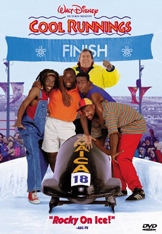EFL Movie Study Guide for:
Cool Runnings

Story: Celebrate the Olympic spirit with this
Disney version of the true story of the first bobsled team from the
Caribbean (1988 winter Olympics in Calgary, Canada). Everyone laughs
when a disgraced coach takes on the challenge of bringing a winter sport
to sunny Jamaica. But see who gets the last laugh when team spirit and a
healthy self-confidence turn disaster and disagreement into Olympic
pride. “Cool runnings” is a Jamaican phrase which, according to the
movie, means “Peace be the journey.” (1993; Disney;
sports/comedy/history)
Note: This will help you understand the tension:
Blitzer, who becomes the Jamaicans’ coach, cheated to win the Olympics
when he was an athlete 20 years earlier. He was so ashamed that he left
his country—the US—and moved to Jamaica to get as far away as possible
from winter sports. Now, Blitzer’s old teammates are US coaches, and his
former coach is now a judge in the Calgary Olympics.
A few terms
(vocabulary):
bookie (bookmaker): someone who collects
bets (money that people want to risk on the result of a race, competition,
etc), pays the winners, and makes money in the process.
bobsled: a small vehicle with two long thin
metal blades instead of wheels, that is used for racing down a special ice
track
zigzag (noun, verb or adj): to move forward
(and esp down a hill) in sharp angles. (In the movie, the coach says
“You’ll be ziggin’ and zaggin’.”)
roller coaster:
a
track with very steep slopes and curves, which people ride on in small
carriages at fairs and amusement parks
cold weather endurance:
the ability to continue working in a very cold
place in spite of difficulty or pain, over a long period of time
intrepid: willing
to do dangerous things or go to dangerous places - often used humorously
line dancing:
a
type of dancing--people dance in lines, all following the same series of
steps
snickering (AmE):
to laugh quietly and in a way that is not nice at something which is not
supposed to be funny (BrE:
snigger)
sarcastic (sarcasm):
saying things that are the opposite of what you
mean, in order to make an unkind joke or to show that you are annoyed
80 miles per hour=133 kilometers per hour
(speed of a bobsled)
Sentences & expressions from the
movie:
“He put weights in the front to make it
faster, and they took away our gold medal.” That is, he cheated by
changing the sled against the rules; the officials found out and
disqualified his team and their first-place time.
“He ran the 100-meter in ten flat; I run it
in nine-nine.” That is, exactly ten seconds, versus 9.9 seconds.
“If I don’t have what it takes, we’ll
forget the whole thing.” That is, if I don’t have the qualities that are
needed for success, I will stop asking for your help and won’t enter the
race.
“Oh, goody.” (“goody” is
a word used by children to express pleasure or
excitement; it’s used here sarcastically to show that sb is not
happy with a comment or situation)
“Do you dig where I’m coming from?” (slang)
That is, do you understand my position, perspective and/or requirements?
“They’re going to turn some heads.”
If something turns people's heads, they are surprised by it.
“Rise and shine!” Often
used humorously to tell someone to wake up and
get out of bed.
“How about if I whip your butt.” & “It’s
butt-whipping time!” (slang) to “whip/kick sb’s butt” means to punish or
defeat them severely
“You choked.” Literally, to choke is to be
unable to breathe because something is blocking
your throat; figuratively (as here) it means to fail at doing something,
especially a sport, because there is a lot of pressure
A favorite dialog
(a bit abbreviated):
--You want to know why I cheated? That’s a
fair question. I had made winning my whole life, and when you do that you
HAVE to keep winning, no matter what.
--But you had two gold medals… you had it
all.
--A gold medal is a wonderful thing. But if
you’re not enough without it, you’ll never be enough with it.
Discussion:
1. Many things are important in sports. List the things you saw
illustrated in the movie. For example, The athletes had to ask the man to
coach them many times, even though he kept saying "no." That illustrates
persistence.
2. With a partner, choose the three most important things from the list we
just created.
3. Did this team win any Olympic medals? Is that important? Why or why
not?
4. Do you agree with what the coach said (see above) about gold medals?
Why or why not?
5. Look back at the list from question one. Which of these things are also
important to learning a language? What other things would you add to this
list?
6. In relation to learning English, what do you (personally) need the most
from this list? Why?
7. In addition to this list, what are some other way that learning a sport
is similar to learning a language?
Discussion (sample answers)
1. persistence, hard work, equipment & tools, a coach, support from
friends & family (and fans), money, commitment, teamwork & communication
with teammates, strength & speed, opportunities to train or practice,
focus
5. Almost all of them. Strength and speed are not important but these are
similar to a good memory
7. Both are about developing a human (not building a machine, writing a
book, etc.). We can be encouraged by all the people who were just like us,
but who achieved greatness in sports or in second language ability. Given
the right equipment and training, we can also develop this skill. We are
not trying to do something impossible. And while competition can show how
good we are, the most important thing about competition is that it makes
all the competitors better, not just the winners.
